Statement at the high-level event on the occasion of the launch of the international decade for action «Water for Sustainable Development, 2018-2028»

Excellency Mr. Chairman!
Excellency Mr. Secretary-General!
Ladies and Gentlemen!
I would first of all like to thank the President of the 72ndSession of the UN General Assembly Mr. Miroslav Lajčák for convening and organizing the High-level Event on the occasion of the launch of the International Decade for Action «Water for Sustainable Development, 2018-2028».
Today’s event coincides with the 25th anniversary of the World Water Day, which is annually celebrated across the world. This fact increases the significance of today’s event dedicated to the launch of the International decade of action.
I do strongly believe that this event will open a new chapter in the United Nations’ engagement aiming at seeking for and finding solutions to the most crucial global challenges related to the effective use and preservation of water resources.
Today it is hard indeed to imagine the smallest corner in our planet – earth where there is no challenge in the field of water resources. We put great focus on the role of this priceless asset in sustainable development. All walks of life and spheres of human activity are closely linked with water resources.
From this point of view, water resources are not only an indispensable component, but essential for sustainable development, which require a comprehensive, holistic and serious approach to their use and conservation for the sake of future generations. It is a pivot of life.
Ladies and gentlemen!
Today we embark on the path towards an implementation of the International Decade, which is aimed at promoting sustainable management and an integrated use of water resources.
It gives us hope that we are starting not from scratch, but with a lot of previous global initiatives in the field of water resources.
We particularly have made a progress over the last 15 years through joint efforts in proclaiming 2003 as the International Year of Freshwater, the International Decade for Action «Water for Life, 2005-2015» and 2013 as the International Year of Water Cooperation.
While implementing these initiatives, we gained a valuable experience that ultimately I believe will help us in tackling new and crucial water related goals and targets.
All these initiatives have made a valuable contribution to enriching our knowledge of nature and of the irreplaceable role of water for life on our planet.
Moreover, these global initiatives have facilitated active involvement of all stakeholders in water resources management, helped to implement projects aimed at improving access to safe drinking water and sanitation, and promoting cutting-edge technologies and innovations.
I would particularly like to highlight contribution of our global initiatives in the implementation of the internationally agreed development goals, in particular the MDGs.
Over this period of time, we stood shoulder-to-shoulder and made every effort to expand cooperation and partnership, build appropriate mechanisms for interaction and dialogue to find best solutions in management and preservation of extremely diminishing freshwater resources in our planet.
The efforts we have made laid a solid foundation for the elaboration of a new sustainable development agenda, in which water resources are prioritized.
Water resources are identified as a key element of development in the new sustainable development agenda. Sustainable development cannot be reached until sustainable and effective water resources management is ensured.
Member states of Friends of Water Group played an important role in the promotion of this paradigm many of which are actively contributing to the advancement of the global water agenda.
I wish to take this opportunity to express deep appreciation and profound gratitude to the missions of all members of the Friends of Water Group for their continued efforts and unwavering support.
I am pleased to also thank all the sponsoring countries of UN GA Resolution 71/222 for their support in proclaiming the period 2018-2028 as the International Decade for Action «Water for Sustainable Development».
The International Decade for Action «Water for Sustainable Development, 2018-2028» is aimed at implementing water related goals and targets and creates a broad platform for capacity development, building up experience and partnership in this field.
The new Decade will contribute to a smooth transition to the implementation of the Sustainable Development Goals.
We do hope that the Decade and its implementation and monitoring mechanisms will significantly help to better coordination and increase of effectiveness of measures the international community takes towards achieving integrated water resources management.
I would also like to note that the existing mechanisms of interaction and partnership among the stakeholders need to be improved.
Distinguished participants,
As it has been already mentioned, in 2016, at the initiative of the UN Secretary General and the President of the World Bank, High-Level Panel on Water was convened and I with delight present you some results of its work.
To provide leadership in tackling the most pressing challenges – an approaching global water crisis, a week ago – on March 14 – the Panel has published an Outcome Report titled “Making Every Drop Count: An Agenda for Water Action” which articulates in three parts:
1) a foundation for action, 2) an integrated agenda for action at local, national and regional levels, and 3) catalyzing change, building partnerships & international cooperation at the global level.
It summarizes the recommendations of the Panel and its initiatives in addressing water challenges at various levels in order to achieve internationally agreed goal of sustainable development, including that contained in SDG 6.
Recommendations of Panel are aimed at shaping the situation as how does the international community understands, values and ensures better water management. To this end, recommendations emphasize the importance of evaluation of water and recognition of its social, cultural, economic and natural values.
The international community is called on to provide an integrated approach to water management, natural disasters risks reduction and building infrastructure and economy.
Increase of the volume and efficiency of investments in water infrastructure, promotion of innovation, expansion of international cooperation and partnership were stated as the fulcrum of recommendations.
In this context, the Panel calls for a policy that would double investment in infrastructure in the next five years.
Of course, a special priority is given to ensuring safe drinking water and proper sanitation conditions as one of the fundamental human rights.
Panel recommendations first and foremost place great focus on political leaders and public opinion makers who represent both the public and private sectors, those who can determine and influence water policy.
Recommendations also urge all stakeholders to unite in the preparation and adoption of measures, as well as strengthen efforts to address water-related challenges at all levels.
The Republic of Tajikistan, as a member of the Panel and initiator of the International Decade of Action «Water for Sustainable Development, 2018-2028» will continue to support and promote the Panel’s recommendations at all levels.
I would like to take this opportunity to express my gratitude to the Secretary-General and his most efficient team for the continued efforts to promote the UN water agenda.
I cannot but commend a pivotal and leading role of the UN Department of Economic and Social Affairs in the implementation of the Decade and the preparation of the Decade Plan of Action, and an unwavering support of the UN-Water mechanism.
In my view, the Action Plan could be an important and timely guide for all stakeholders in achieving goals and objectives contained in the Decade.
Ladies and gentlemen!
It is obvious that our joint path towards an implementation of new tasks and objectives in the field of water resources is not going to be easy and smooth.
Many and new set of challenges most likely are going to facing us in this road. We should look for the best way to tackle the problem. We should take into account a series of challenges that may pose additional and complicated tasks ahead of us.
In this context, we should not stand aside and proceed to deed right now, to determine scope and possibilities for our further strong and wide-ranging cooperation in the field of water resources:
The first is climate change, which adversely affects the quality and quantity of water resources. It undermines our efforts to achieve sustainable development goals.
Over the last few decades of the past century, more than 1,000 glaciers in Tajikistan have completely vanished. It means over 30% of their volume is melted away, and the horrible thing is, that this is steadily continues.
Over this period of time, icecap called “Fedchenko” – largest continental glacier, is retreated by almost one kilometer and its area is decreased by 11 square kilometers, having lost approximately two cubic kilometers of ice.
Due to an adverse impact of climate change in recent years in Tajikistan, where 93% of the territory is mountainous, there is an increase in the intensity of natural phenomena associated with water resources, which cause enormous material and moral damage.
Natural disasters also jeopardize our efforts to achieve sustainable development goals and cause added challenges in reducing poverty.
The second: population growth and increase in needs of water resources, which bring in new and complex objectives to address.
Demand for water resources all over the world is growing at a rapid pace, which, in turn, causes serious tensions between sectors of the economy. Tough competition for water resources in terms of increasing desperate water shortage can lead to negative repercussions on even individual country.
We do believe that the widespread introduction of integrated and nexus approaches in water management opens up new opportunities for the improvement of the existing tools of inter-sectoral and intergovernmental water cooperation.
The third: gender aspect of water issues, which have to be taken into account. Women should be actively involved in the development process by empowering them in the management and conservation of water resources.
Effective involvement of women in these processes can be the key to our success in addressing water challenges and achieving sustainable development.
The fourth: toolkits for implementation, by which we must consolidate our plans and actions.
In particular, I mean human and financial resources, investments and state-of-the-art technologies.
Cooperation in the field of education and culture of sustainable water management and water consumption could be a critical element of our joint, concerted efforts.
Expansion of public-private partnerships explores new opportunities for achieving goals in ensuring access to water and sanitation for all.
Tajikistan has spent nearly one billion US dollars over the past fifteen years to provide access to safe water and sanitation.
As a result of measures taken by the Tajik Government during the last five years, about 1,2 million people have gained access to improved water supply conditions and 600 thousand people have been given access to safe drinking water.
The fifth: trans-boundary component of water cooperation, which plays a central role in ensuring peace, stability and development.
Today, there are more than 276 international river basins in the world which cover 148 countries and where over 40% of the world’s population live.
Strong and productive water cooperation can be a catalyst for development, however lack of such cooperation can cause serious risks and heavy costs, negatively affecting economic and social situation in landlocked countries.
Strengthening the institutional capacity of cross-border water cooperation in many regions worldwide, contributes to the harmonious development of all riparian countries.
Central Asia today actively promotes a process of regional integration, which, in our view, should help to improve regional cooperation in water and energy issues.
Ladies and gentlemen!
In conclusion, I would like to emphasize that the achievement of sustainable development, prosperity and security would be possible only through building up effective and rational water cooperation based on mutual trust, fair consideration of needs and consumption, and involvement of all stakeholders, as well as the continuous efforts to seek for and improve water dialogue and genuine partnership.
To make discernible progress in these areas we need to have strong, invariable political will, stern resolve, sufficient resources and clear-cut enduring decisions. We should get to the bottom of problem and what the solutions could be. I trust we can find best solution for the good of generations to come.
The International High-Level Conference on the International Decade for Action «Water for Sustainable Development 2018-2028» which is going to be hosted by the Government of the Republic of Tajikistan in cooperation with the United Nations agencies and other partners in Dushanbe on June 20-22 this year will focus on the discussion of these and other topical issues of water cooperation.
We at the Conference also intend to continue and expand the framework of our today’s dialogue, which can give a new impetus and spur to increasing efforts towards the implementation of the Decade.
Furthermore, Dushanbe Water Conference would be a timely and solid platform for the elaboration of specific recommendations how to strengthen efforts in achieving water related goals and objectives in a run-up to the forthcoming UN High-Level Political Forum on Sustainable Development, which is set to review Sustainable Development Goal 6.
I seize this opportunity to invite all of you to attend the upcoming Dushanbe Water Conference. I look forward to meeting you all at the Conference this June.
Thank you!











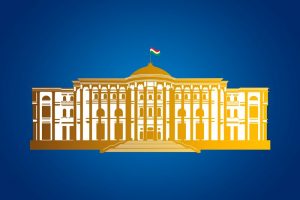 Congratulatory Message of His Excellency Emomali Rahmon, President of the Republic of Tajikistan, on the 33rd Anniversary of the Armed Forces
Congratulatory Message of His Excellency Emomali Rahmon, President of the Republic of Tajikistan, on the 33rd Anniversary of the Armed Forces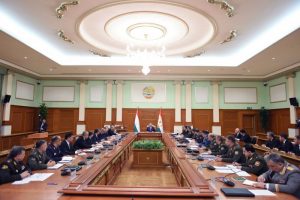 President Emomali Rahmon Holds Security Council meeting
President Emomali Rahmon Holds Security Council meeting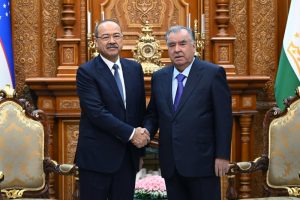 President Emomali Rahmon Receives the Prime Minister of the Republic of Uzbekistan Abdulla Aripov
President Emomali Rahmon Receives the Prime Minister of the Republic of Uzbekistan Abdulla Aripov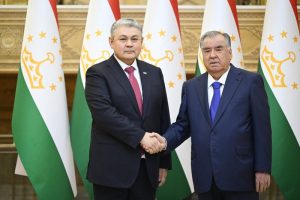 President Emomali Rahmon, Received the Minister of Foreign Affairs of the Republic of Kazakhstan
President Emomali Rahmon, Received the Minister of Foreign Affairs of the Republic of Kazakhstan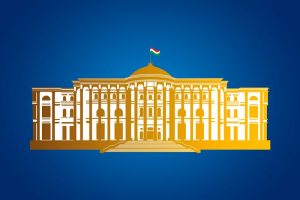 President Emomali Rahmon Enacts New Laws
President Emomali Rahmon Enacts New Laws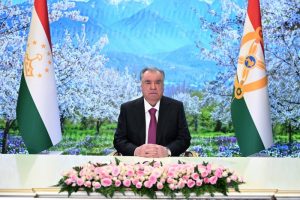 President Emomali Rahmon Sends Festive Greetings to President Xi for Chinese New Year
President Emomali Rahmon Sends Festive Greetings to President Xi for Chinese New Year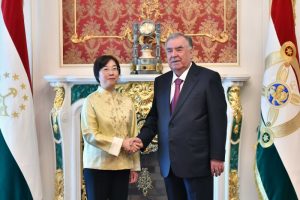 President Emomali Rahmon Receives AIIB President Zou Jiayi in Dushanbe
President Emomali Rahmon Receives AIIB President Zou Jiayi in Dushanbe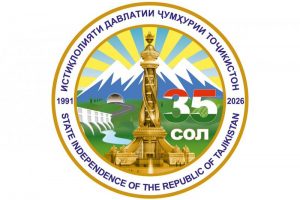 President Emomali Rahmon Approves Emblem for the 35th Anniversary of Tajikistan’s State Independence
President Emomali Rahmon Approves Emblem for the 35th Anniversary of Tajikistan’s State Independence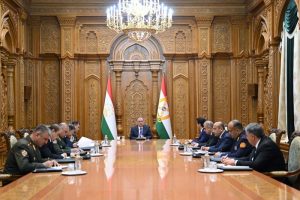 President Emomali Rahmon Holds Working Meeting with Heads of Security and Law Enforcement Agencies
President Emomali Rahmon Holds Working Meeting with Heads of Security and Law Enforcement Agencies














